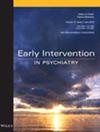Cloud-Enabled Mobile-Based Approach for Enhancing Psychosis Cognitive Assessment
Abstract
Aim
The study aims to assess the feasibility of developing cognitive tools and integrating the cloud-enabled mobile-based technology into routine clinical practice for psychotic patients. Furthermore, it aims to investigate the correlation between the results obtained using developed tools and established clinical measures, offering valuable insights into tools for enhancing the accuracy, efficiency and ease of administration of cognitive evaluation.
Methods
A total of 160 participants were recruited (83 outpatients with early course of schizophrenia (SZs) and 77 healthy controls [HCs]). The participants were subjected to cognitive assessments, and the data were collected by cognitive assessment digital smart tool (CADST) and PGI memory scale (PGIMS) to assess attention (ATT) and working memory (WM). Outcome measures of these parameters were digit span (score,time) for ATT and delayed recall (score,time) for WM.
Results
The total average score in HCs was significantly higher than in SZs for ATT and WM, and CADST was significantly correlated with PGIMS for evaluating ATT and WM. Furthermore, test completion times for ATT and WM were observed more in SZs although most of SZs had achieved scores as high as that of HCs.
Conclusion
The potential of CADST as a valuable addition to the conventional cognitive assessment method is highlighted, showing promising feasibility and strong correlations with the established tool. The importance of integrating time parameters suggests broader implications for understanding cognitive function beyond conventional scoring metrics. It demonstrates the effective and accurate approach for large-scale screening of cognitive parameters in public service settings.

 求助内容:
求助内容: 应助结果提醒方式:
应助结果提醒方式:


